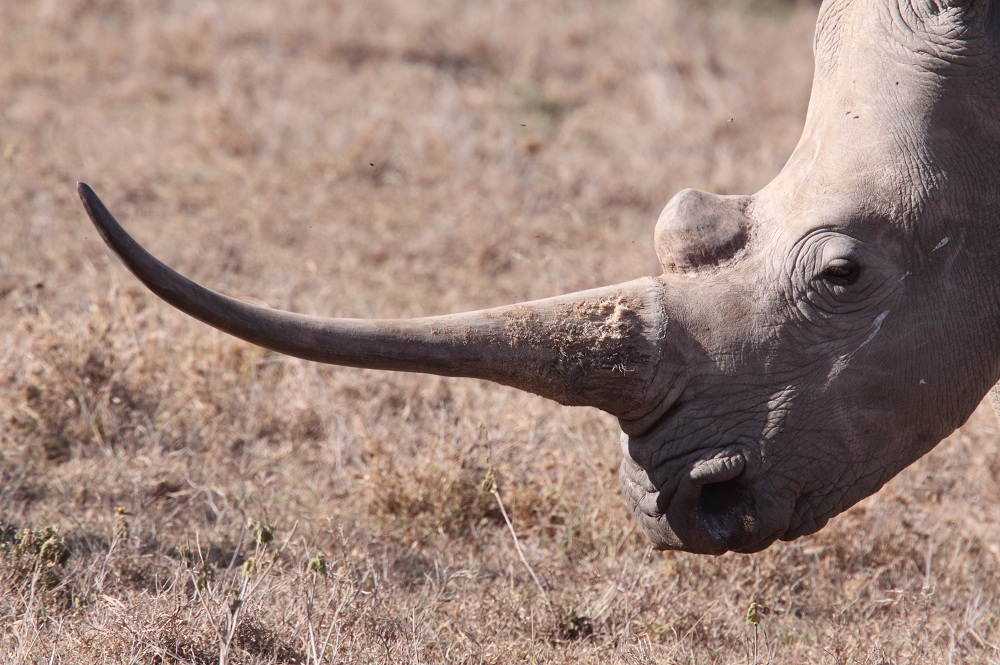In 2018, we published Sounding the Horn, a report that analysed the ‘antique’ rhino horn items offered for sale by UK auction houses during 2017. Since then, we’ve been continuing to look into this trade, and now we’ve released an updated report including all 1,571 rhino horn antique items offered for sale in the UK in 2017, 2018 and 2019. We found some extremely worrying issues.
First, let’s state that the sale of genuine antique rhino horn items (i.e. all items dated pre-1947 and ‘worked’, which means altered from their original state, often by carving, not whole horns), is legal to sell in the UK. However, we fear that criminals are using loopholes in the system to sell modern rhino horn items, laundering them through the UK antique market to consumers in Asia. The serious issues we found show that this criminal activity is highly likely in the UK and, with a recent case in France highlighting similar activity, it’s clear that the illegal trade in rhino horn is not just something to tackle overseas.
Co-author and long-time supporter of Save the Rhino International, Sue Brace, says,
“This report shows that stopping the illegal rhino horn trade isn’t just something that needs to happen overseas, it’s a problem at home in the UK, too. Rhinos are in enough danger as it is, we can’t allow the UK to be part of the supply chain that’s driving devastating poaching numbers and causing rhino numbers to plummet. We’re calling on UK politicians and regulators to ensure that the sale of rhino horn through the UK antique trade cannot be exploited, and to implement effective new legal controls to close the current serious, systemic loopholes once and for all.”
Here are our concerns highlighted in our latest research:
- A significant amount of lots sold were purchased for <£200, potentially less than the ‘grind down’ value of rhino horn, making the trade vulnerable to individuals looking for a cheap supply of powdered horn
- The number of lots offered in 2019 (648) was 101% higher than the number offered in 2017 (323)
- Detailed age estimates were missing on most lots offered, making it impossible to prove that the items were pre-1947 (it is illegal to sell any rhino horn dated from post-1947). 99.9% of
- items offered were not radiocarbon-14 dated, 94% were listed with no detailed history, and 30% had no age estimate at all
- Five auction houses advertised lots in Mandarin, clearly catering for Chinese buyers (China, alongside Viet Nam, is a key consumer market for rhino horn), and 44 auction houses included the weight of the rhino horn within adverts – surely anyone looking to purchase a genuine antique would not be interested in the weight of the rhino horn? This information would be catering to individuals hoping to illegally extract the rhino horn for consumption
- Several strikingly similar, modern-looking lots started appearing in 2019. Some of these items have since become the subject of ongoing police investigations
Save the Rhino’s CEO and co-author of the report, Cathy Dean says,
“As the number of lots offered for sale increase and the average price has reduced, strengthening the rules around this trade is urgent. A civil court case that has just concluded in France convicted eight men of trafficking rhino horn and elephant ivory, citing evidence that they had ground down rhino horn into powder or flakes for illegal export to East Asia. We believe it highly likely that similar crimes have been, and are being, committed in the UK.”
Loopholes in this trade are putting rhinos at risk, and the Government and the antique trade must do more to close them. We’re calling on everyone to do more to ensure that illegal rhino horn cannot be laundered through the UK.









